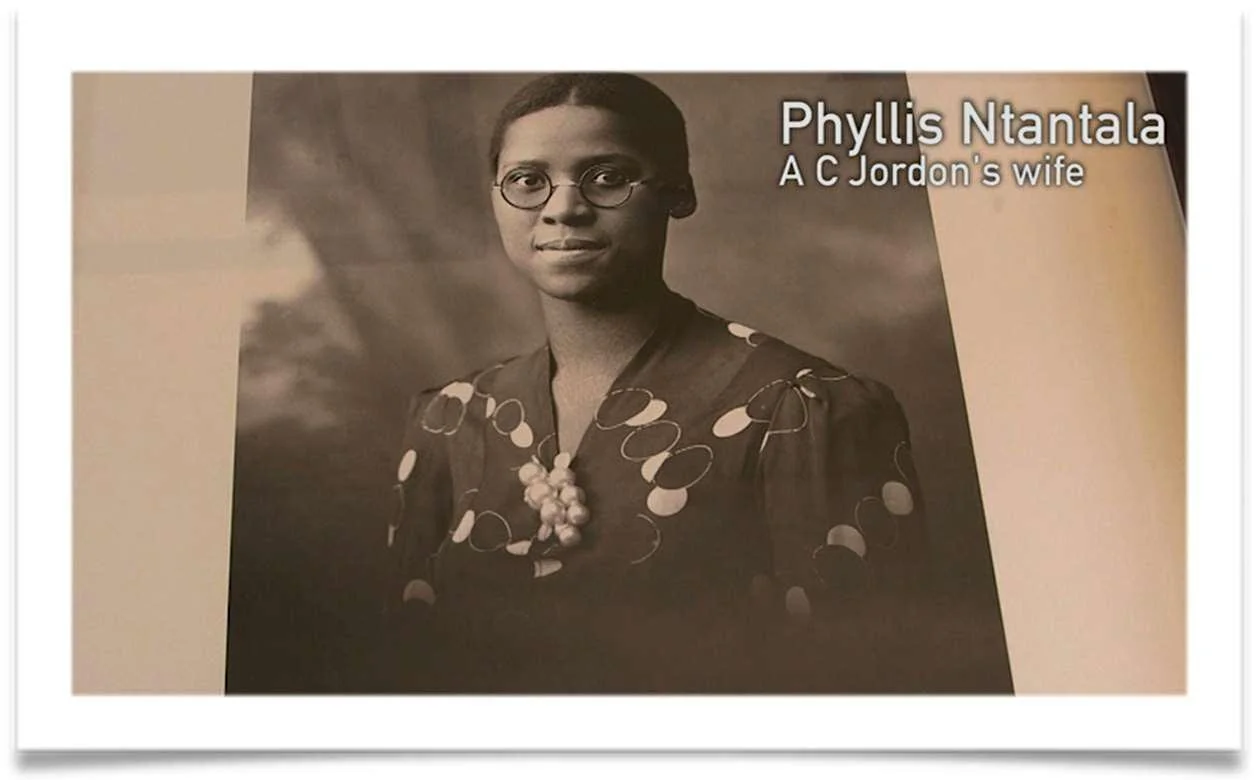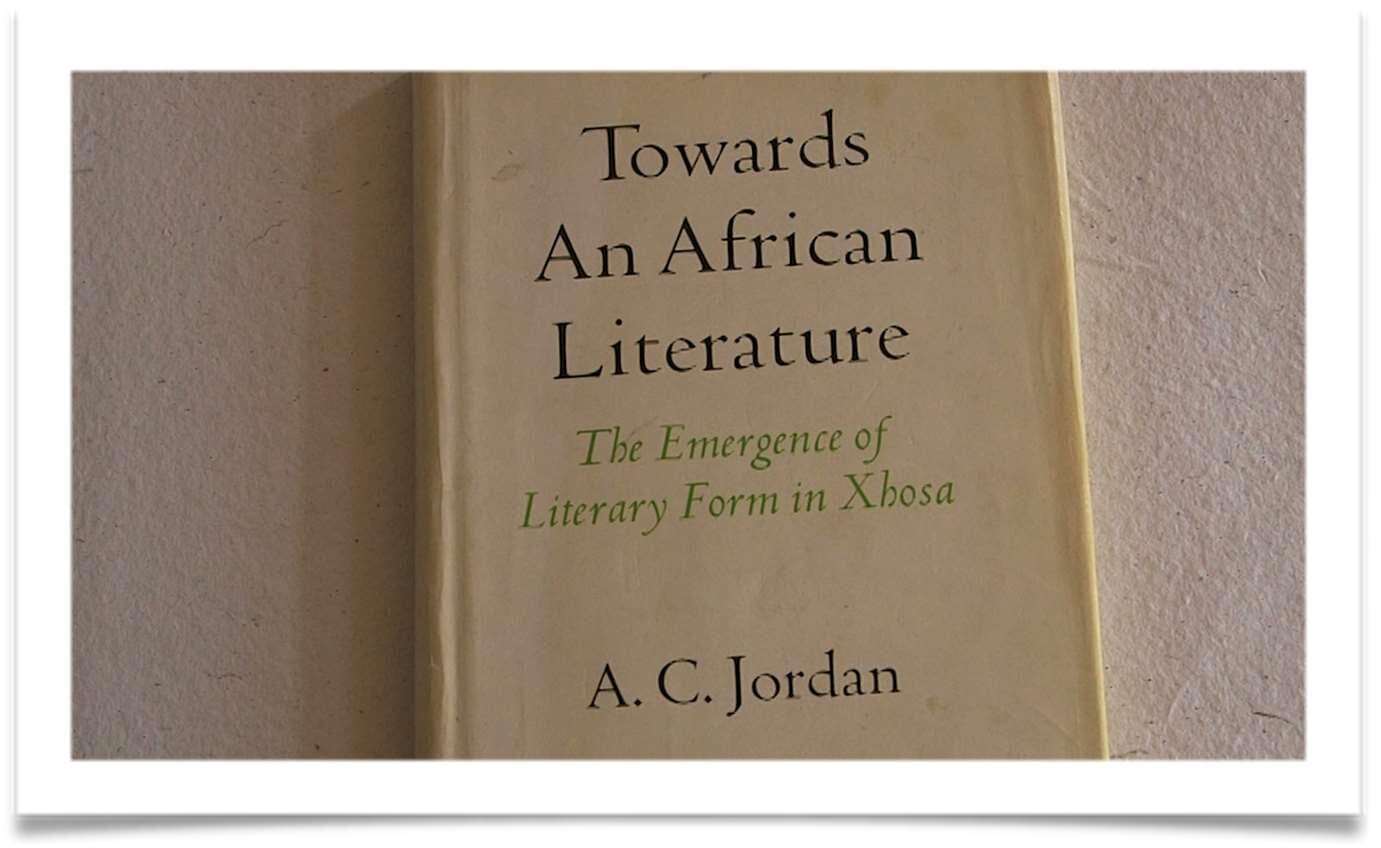Mzolisa Archibald Campbell ‘AC’ Jordan
Writer, Academic & Pioneer of African Studies (1906 – 1968)
Mzolisa Archibald Campbell ‘A C’ Jordan, the son of an Anglican church minister, was born on the 30th October 1906 at the Mbokothwana Mission in the Tsolo district of Pondoland in the Cape Colony. He excelled as a poet, novelist, literary historian and intellectual pioneer of African Studies in South Africa. He died in exile in the United States in 1968.
One of his most prophetic poems…
The Open Door
United we come, as children of the soil,
hoping to take our place and claim our share;
they showed us the door, closed it in our face,
and the nations gathered to apportion the wealth….
We break our backs building big palaces,
Palaces that make us homeless squatters;
We hew the fire-logs; we dig the coal mines,
For fires to warm these in the big palaces,
While we shiver with cold in our windy shacks….
All the nations glory in their wealth,
All the nations are immersed in light,
All the nations have acquired wisdom,
All, all the nations have a place and a share,
But where, where is the share of the children of the soil?
Opening Doors
Dr AC Jordan spent his life demanding that doors be opened at a time when access to opportunity was denied black people.
In an article on A C Jordan, an academic, Phil Ndlela said; “Jordan ranks as one of those value-oriented intellectuals who were maligned by the establishment for daring to speak the truth. He consciously deployed his scholarship to advance the cause of the underdog, the voiceless and the marginalised.”
A C Jordan began his schooling at St Cuthberts Primary School in the Eastern Cape and was awarded the Andrew Smith bursary as an outstanding student. This allowed him to attend Lovedale College in Alice, where he passed his Junior Certificate (Grade 10). In 1923 he went on to study at St John’s College in Mthatha in the Eastern Cape where he trained as a teacher.
After being awarded a scholarship he began his academic studies at Fort Hare University College where he completed a BA degree in 1934, majoring in literature and linguistics. In 1942 he submitted his Master’s degree thesis to the University of South Africa. It was entitled “Some features of the phonetic and grammatical structure of the Bhaca focusing on the Tekela Nguni language”. In 1957 he followed up at UCT with his doctoral dissertation, “A Phonological and Grammatical Study of Literary Xhosa.” He was the first black man to achieve his doctorate at UCT. It had been no easy road to reach this achievement.
Marrying Phyllis Ntantala
A C Jordan had been a teacher for ten years in Kroonstad where he also became involved in teachers’ political activities. He became the President of the African Teacher’s Association. He also began to engage in creative writing for the Imvo Zabantsundu newspaper. It was during this period of his life that he wrote the Xhosa classic Ingqumbo Yeminyana (also published in English as The Wrath of the Ancestors).
In January 1940, A C Jordan married a fellow teacher at the school in Kroonstad, Priscilla Phyllis Ntantala who was a writer, intellectual of note, feminist and political activist in her own right. They had first met at Fort Hare University. Phyllis was born into at privileged family at Gqubeni, near eDutywa in the Eastern Cape. Her father was a successful farmer who was on the Transkei General Council, known as the iBhunga.
Retired politician, Pallo Jordan
A C Jordan began teaching in the Department of African Languages at the University of Fort Hare in 1945, succeeding the famous Davidson Don Tengo Jabavu. But a year later he gave up the post to move to Cape Town, where he was appointed as a lecturer in Bantu Languages at the University of Cape Town. Through the couple’s teaching work and membership of Teacher’s Associations they also became active in the teachers political organisation – the Non-European Unity Movement.
The Jordan family first took up residence in Moshesh Avenue in the Langa township but they later wrote to Governor-General Brownlee, to ask for permission to purchase land from a Mr Guttman in Fleur Street, Lincoln Estate, Cape Town. The permission was granted and they established their home,’Thabisano’, (a place of rejoicing) in Lincoln Street in Athlone. Their children were sent to St Marks Church School in Athlone, Rosmead School and Livingstone High School in Claremont at a time when coloured and black people were separated by apartheid.
This was all contrary to the dictates of the Group Areas Act which had been introduced in 1950. Both A C Jordan and his wife were highly active in campaigns against the Group Areas Act of 1950, the Bantu Authorities Act of 1951, the Jan van Riebeeck celebrations at the Grand Parade in Cape Town in 1952 and the Bantu Education Act of 1953. This was the milieu in which A C Jordan became the first black man to receive a doctorate at the University of Cape Town.
While lecturing at UCT, he developed a new method of teaching Xhosa to speakers of other languages which involved also using Xhosa culture in his instruction. He codified this method and published it in 1966 as ‘A Practical Course in Xhosa’.
Remarkable Rapport
An eminent scholar, Harold Scheub gave the following insight on his teacher Dr AC Jordan:
“He loved his students, and his students reciprocated with an affection that was profound and respectful.
“In the classroom and outside, Professor Jordan was able to create and exploit a remarkable rapport with his students, a relationship that was compounded of his brilliance, his warmth and his accurate insights.
“Wit, charm, scholarship, a splendid combination of gentleness and selfless interest, a richly romantic man of vision, a deeply contemplative man who belonged to no routine, who seemed limited by no physical time.
“He was that rare teacher who knew how to listen, not because he had perfected the art of
listening, but rather because he was genuinely interested in, excited by, the ideas of others.”
But A C Jordan’s term was very short at UCT. Like many other teachers and lecturers involved in opposition to the Apartheid state, A C Jordan and his wife Phyllis were targeted by the apartheid Security Police. During the state of emergency instituted by the government after the Sharpeville massacre and Langa protest of March 1960, A C Jordan was arrested and assaulted. The family had reached the end of the road in terms of legal space for opposition and for unbridled academic activity and decided to go abroad.
In 1961, A C Jordan was awarded the Carnegie Travel Grant to tour universities and colleges in the United States of America. As a high profile opponent to the Apartheid regime he was refused a passport. He decided to leave South Africa on an exit permit with his son Zweledinga Pallo Jordan, using the ‘liberationist route’, via Botswana and Tanzania to London. From London the family went to the United States where he became a professor in African Languages and Literature at the University of California’s Los Angeles campus. Later he went on to teach at the University of Wisconsin in Madison which was his home until he passed away in 1968.
Posthumously ‘Kwezo Mpindo zeTsitsa’ was published in 1970, as was his critical study of Xhosa literature published in 1972 ‘Towards an African Literature: The emergence of literary form in Xhosa’, as well as a collection of short stories in Xhosa, translated into English – ‘Tales from Southern Africa’ in 1973. Phyllis Ntantala translated ‘Ingqumbo Yeminyana’ which was published in English as ‘The Wrath of the Ancestors’ in 1980. A decade later it was translated into Afrikaans as ‘Die Toorn van die Voorvaders’. It was translated into Dutch in 1999.
Awards
The University of Port Elizabeth conferred a doctorate in literature on Mzolisa Archibald Campbell Jordan in 2004 and he was honoured by the state with the Order of Ikhamanga in Gold award in September 2005.
His son Zweledinga Pallo Jordan who was born in Kroonstad in 1942 joined the African National Congress in exile and rose to become an outstanding intellectual in its ranks despite the challenges and disruptions faced in his academic education. He served on the National Executive of the ANC and was a cabinet minister from 1994 until 2009 in the post-Apartheid government. Below is another of his poems:
You Tell Me To Sit Quiet…
You tell me to sit quiet when robbed of my manhood,
With nowhere to live and nought to call my own,
Now coming, now going, wandering and wanting,
No life in my home saves the drone of the beetle!Go tell the worker bees,
True guards of the hive,
Not to sting the rash hunter
Who grabs at their combs.You tell me in spite of the riches of knowledge
Unveiled all around, replenishing the earth,
To live here forever enslaved by the
darkness of ignorance, abject and empty of mind!Go tell the drooping grass,
Frost-bitten and pale,
Not to quicken when roused
Commenting on this poem, renowned author and scholar Mbulelo Vizikhungo Mzamane writes:
The English version cannot conceivably do justice to the original. It does not carry the suggestion of such a dismissive Xhosa phrase as “Hamb’okunya!” (“Go and shit!”), which is clearly conveyed by the phraseology and tone of the Xhosa rendition in the first line of each quatrain – “Go tell the worker bees … Go tell the drooping grass …” The idiom of the Xhosa is fraught with sinister innuendoes.
In his appreciation of the poem Dan Kunene suggests that the poem shows Jordan’s immersion in South African politics and his anger in a situation where one is “told to sit quiet” or face the dire consequences. The statement and response format of Jordan’s poem derives from the African Ingoma (Song). The last stanza conveys Jordan’s own frustration at conditions in South Africa, especially after the introduction of Bantu education, which sought to exclude Africans from the pool of knowledge (Mzamane 1984:151–2).
“You Tell Me To Sit Quiet” was initially written in isiXhosa and later translated into English by the author himself. In an assertive voice Jordan argues for volubility and action. He gallantly stands up for his principles. He is able to see through the apartheid government’s underlying intentions and consequences.
References
E.J. Verwey, (1995), New Dictionary of South African Biography, volume 1. Human Sciences Research
Council, pp 108-109South African Government Information, (2005), National Orders awards Archibald Campbell Mzolisa Jordan (1906 – 1968), www.info.gov.za
South African History Online, Archibald Campbell Mzoliza Jordan, Xhosa writer and linguist.
Ntantala, Phyllis; A Life’s Mosaic: The Autobiography of Phyllis Ntantala. University of California Press. (1995)
Encyclopaedia Britannica; South African Author – AC Jordan
Wikipedia; Archibald Campbell Jordan;
Phil Ndlela; (2014) Celebrating the intellectual legacy of AC Jordan




